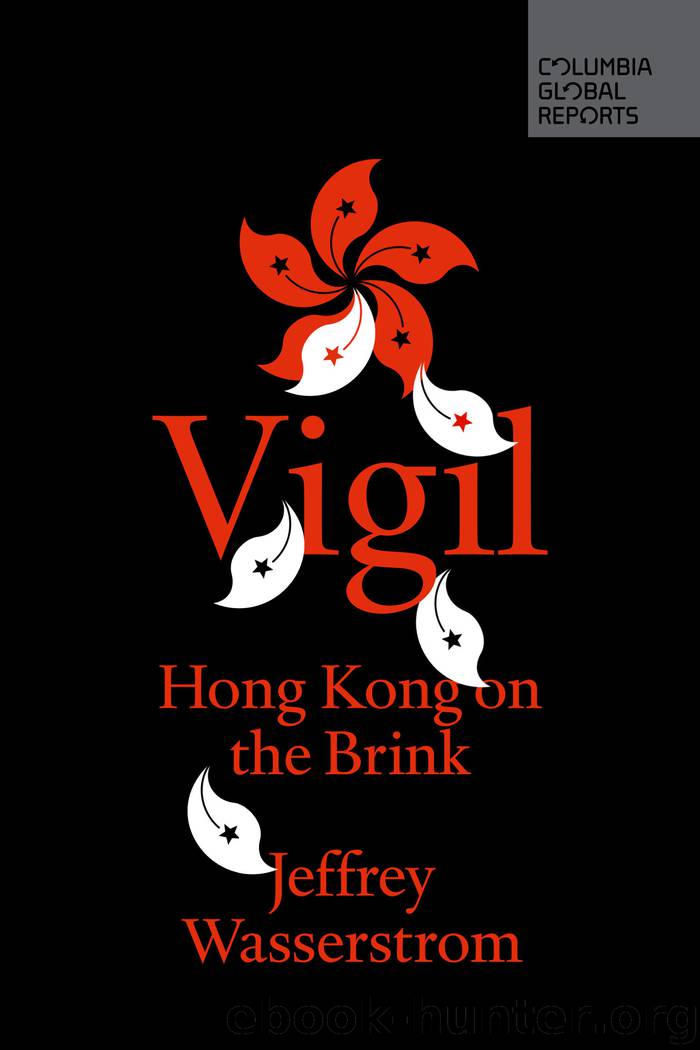Vigil by Jeffrey Wasserstrom

Author:Jeffrey Wasserstrom
Language: eng
Format: epub
Publisher: Columbia Global Reports
Published: 2019-03-09T16:00:00+00:00
Battles
When the Occupy zones were finally abandoned late in 2014—something that was widely interpreted as a success for the government’s strategy of waging a war of attrition against the protesters and simply waiting them out—some protesters made final statements of defiance by writing on banners, posters, and blackboards a simple phrase: “We’ll Be Back.”
The Civil Human Rights Front is known for staging big protest events that are planned well in advance. These generally take place on symbolically charged dates, such as July 1. The organization also helps mount ad hoc demonstrations. One of these took place on April 28, 2019. Tens of thousands of people gathered that day to express their outrage at the sentencing of Benny Tai, Chan Kin-man, and other leaders of Occupy Central.
They also called for the withdrawal of a proposed extradition bill, which had not yet become globally famous and infamous. At present, Hong Kong has extradition treaties with twenty countries, but the new bill, introduced in February, would permit the Hong Kong government to entertain certain extradition requests from any nation—among them the PRC. Chief Executive Carrie Lam found a handy defense of the bill in the case of twenty-year-old Chan Tong-kai, a Hong Kong man who confessed to murdering his girlfriend in 2018 in Taiwan, a country with which Hong Kong has no extradition agreement. The new extradition bill, Lam said, would facilitate the return of Chan to Taiwan to face trial and allow justice to be done.
But the bill’s many critics believed its real impetus lay not in Taiwan but in mainland China. That Hong Kong currently has no extradition agreement with the PRC speaks to the hallowed place the territory’s judicial independence holds in the infrastructure of semi-autonomy guaranteed by the Basic Law. The new bill would change that, allowing Hong Kong to extradite people accused of certain crimes by the PRC across the border to the mainland. For many, the prospect called to mind the fate of the five abducted booksellers three years prior—people who had broken no Hong Kong laws, but faced draconian penalties under the nominally distinct mainland legal system. If passed, its critics said, the bill would amount to an unprecedented erasure of the political and legal autonomy Hong Kong had been promised.
Estimates of the crowd size for the April 28 protest ranged widely: The police said fewer than 30,000 people had marched, while the organizers claimed more than 120,000 had. No matter which estimate one believed, it was the biggest demonstration Hong Kong had seen since Lam became chief executive in 2017.
The Civil Human Rights Front was cheered by the turnout. Its members were convinced, though, that they could do better. Late in May, one of its leaders, Jimmy Sham, announced the group’s plans for an ambitious follow-up march that would send a clear message to Lam to withdraw the hated bill, and would, if successful, also show more generally that the post-Umbrella pattern of malaise interspersed with brief bursts of outrage was over, and that a time of sustained action was back.
Download
This site does not store any files on its server. We only index and link to content provided by other sites. Please contact the content providers to delete copyright contents if any and email us, we'll remove relevant links or contents immediately.
| Arms Control | Diplomacy |
| Security | Trades & Tariffs |
| Treaties | African |
| Asian | Australian & Oceanian |
| Canadian | Caribbean & Latin American |
| European | Middle Eastern |
| Russian & Former Soviet Union |
The Secret History by Donna Tartt(19088)
The Social Justice Warrior Handbook by Lisa De Pasquale(12190)
Thirteen Reasons Why by Jay Asher(8910)
This Is How You Lose Her by Junot Diaz(6887)
Weapons of Math Destruction by Cathy O'Neil(6280)
Zero to One by Peter Thiel(5802)
Beartown by Fredrik Backman(5754)
The Myth of the Strong Leader by Archie Brown(5507)
The Fire Next Time by James Baldwin(5446)
How Democracies Die by Steven Levitsky & Daniel Ziblatt(5219)
Promise Me, Dad by Joe Biden(5153)
Stone's Rules by Roger Stone(5088)
A Higher Loyalty: Truth, Lies, and Leadership by James Comey(4964)
100 Deadly Skills by Clint Emerson(4925)
Rise and Kill First by Ronen Bergman(4789)
Secrecy World by Jake Bernstein(4753)
The David Icke Guide to the Global Conspiracy (and how to end it) by David Icke(4720)
The Farm by Tom Rob Smith(4513)
The Doomsday Machine by Daniel Ellsberg(4490)
